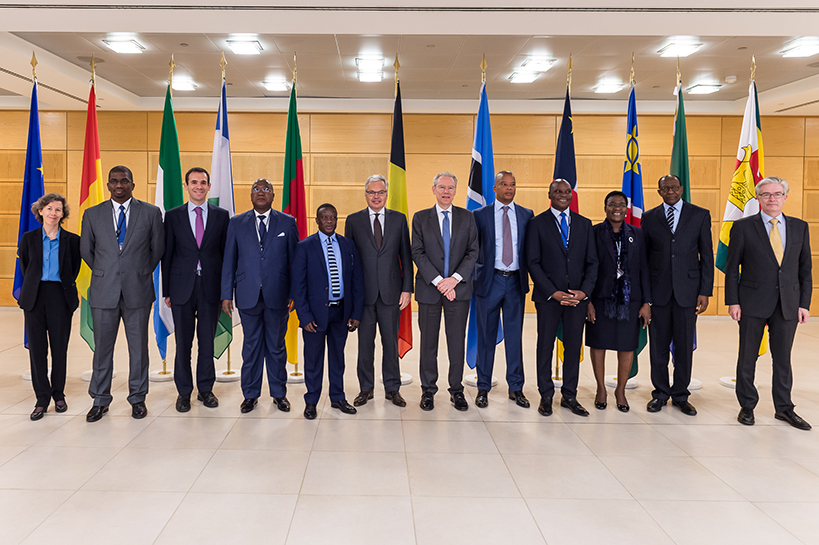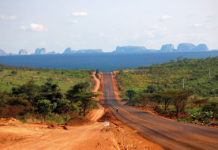Given its position in the largest rough diamond trading centre in the world, the AWDC collaborates with African countries on a daily basis. To give an idea about the importance of the diamond industry in its bilateral relations with Sub-Saharan Africa: no less than 30% of all diamond imports to Antwerp come from Africa. This is only logical, given that Africa accounts for 56% of the total global production value of rough diamonds.
Sharing close economic ties with African diamond-producing countries (DPCs) comprises a number of challenges and opportunities. In its Masterplan 2020, launched in 2012, the AWDC expressed a clear commitment to responsible business practices and sustainability, making it a pioneer among diamond trading centres. Integrity, transparency and sustainable development are key values in all of the AWDC’s involvements with African DPCs.
The fact remains, however, that while diamonds are an important source of revenue in many developing countries, they are also often linked to unfair practices, poor governance, unregulated markets, illegal exploitation, human rights abuses and so on. It is important that the diamond industry, as well as governments, acknowledge this situation and realign the trade to have a positive impact in African DPCs. Any effort in this regard would also contribute de facto to more integrity in the supply chain.
When looking at issues of human rights, labour rights and environmental impact, one should differentiate between large-scale mining and artisanal and Small-Scale Mining (ASM). Globally, 14% of the world’s diamonds are mined via ASM operations, of which the largest part is situated on the African continent.
Across Africa, efforts to create a sustainable development framework for ASM have been difficult. To facilitate these efforts, the AWDC in 2015 actively backed My Fair Diamond , a project from CAP Source, in collaboration with the Diamond Development Initiative (DDI), an NGO focusing on enhancing the working and living conditions of artisanal and small-scale miners. The project set out to establish fully ethical and traceable diamond jewelry from artisanal mines in Koidu, Sierra Leone.
All diamonds used in this project are certified by the DDI’s Maendeleo Diamond Standards, which ensure respect for human rights, decent work, health, safety and protection of the environment. They contribute to the development of local mining communities and truly benefit them, making sure the miners obtain fair and equitable prices for their diamonds.

The positive results from this project convinced AWDC to start an even more ambitious project in Guinea, one of the partner countries of Belgian governmental cooperation and an important DPC. The objective of this public-private-civil society partnership is to open an official channel to the international trade for fair trade diamonds originating from certified artisanal mines. It aims to bring adequate development aid to the benefit of isolated mining communities and provide them with technical expertise and knowledge of the international diamond trade. From a fair trade as well as a commercial point of view, we expect to deliver fully traceable and socially responsible diamonds to the market. The AWDC is currently steering this multi-stakeholder initiative and hopes to get this project up and running in the near future.
Alongside these projects, the AWDC also supports the government services in African DPCs. We regularly offer courses for representatives from these countries, our experts teaching officials and miners how to sort and value diamonds and to better understand the value of a diamond (also for taxation purposes) on the international market. The level of knowledge and expertise in Antwerp is amongst the highest in the world. By offering these training courses free of charge, we endeavor to help these countries obtain more knowledge of, and ultimately more revenues from their precious stones.
Equally, at the political level, the AWDC understands the need for open dialogue with the governments of producing countries. This dialogue has already been formalised through platforms like the Kimberley Process (KP), but the challenges the diamond industry is facing go deeper than the KP mandate. This is why, in November 2017, the AWDC organised the first African Diamond Conference (ADC) with the support of the Belgian FPS Foreign Affairs, to discuss key issues for African DPCs, including how to create responsible supply chains.
Building on the momentum of the first ADC, and to promote good governance in the diamond industry, the AWDC is currently planning a second edition of the ADC, with the support of the South African government. The conference will be held mid 2020 in South Africa. The AWDC hopes to further deepen our bilateral relations through this conference, so we may jointly tackle the opportunities and challenges the global diamond industry is facing, now and in the future. Structured dialogue and cooperation are key to achieving more transparent diamond supply chains with positive impact to all players involved.

![[:en]DIAMANT_1[:]](http://perspectives-cblacp.eu/wp-content/uploads/2019/10/DIAMANT_1-696x522.jpg)


